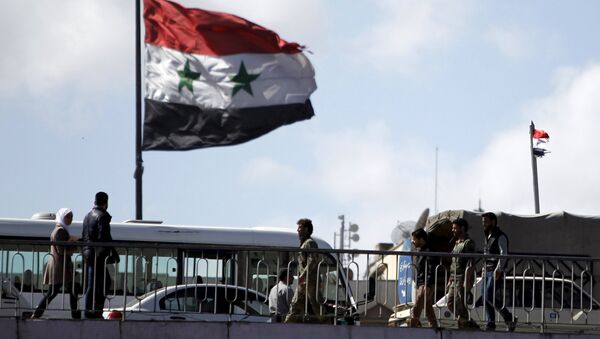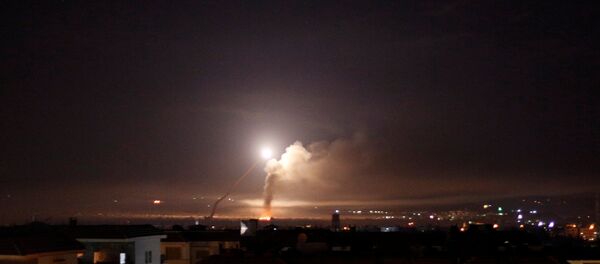Explosions were heard on Saturday night south of the Syrian capital of Damascus, Israeli media reported, citing Sky News in Arabic. According to the media outlet, the blast took place near a security facility allegedly "used by Iranian forces."
While the reports have yet to be verified, Damascus hasn't also issued a statement, commenting on the claims.
The reported blasts take place less than two weeks after the Israeli Air Force hit dozens of what it described as Iranian targets in Syria after 20 rockets had been fired at the IDF positions in Golan Heights, which had been occupied by Israel during the 1967 Six-Day War with Syria and annexed the territory in 1981. The international community has not recognized Israel's annexation of the Golan Heights, with the UN condemning the move in 1981 and 2008 and Tel Aviv saying that it the territory, which has remained an apple of discord for Israel and Syria, would never be returned to Damascus.
READ MORE: Israel 'Must Destroy Any Trace of Iran in Syria, Put Genie in Bottle' – Minister
Damascus stated that Syria would counter all the attacks by the Israeli forces on its sovereign territory and will not hesitate to strike Israeli military targets as it has a right for self-defense. When commenting on the latest Israeli attack in Syria, the Iranian Foreign Ministry slammed the move as "an act of aggression" and a breach of the Arab country's sovereignty.
Last week, Lebanese Shiite Hezbollah movement issued a statement, taking responsibility for the attack and saying that it represents a "counteraction strategy" to Israeli policy. The Israeli and US officials have been accusing Iran of militarily backing Hezbollah, which is listed as a terrorist organization in the United States, Israel, and several Arab countries despite being part of the Lebanese parliament, however, Tehran insists that its support for the Shiite movement is only political.
Israeli relations with Iran have been extremely escalated, with Israeli officials repeatedly saying that the Jewish state would not allow Iran to turn Syria into its military foothold, and Tehran refuting the claims, while admitting sending exclusively military advisors to the country in order to help Damascus fight terrorism. In addition to this, the Israeli authorities have voiced concern over the 2015 Iranian nuclear accord, with Prime Minister Netanyahu saying earlier this month that Israel had obtained 100,000 paper and digital documents, which, he said, irrefutably prove that Iran's nuclear program had a secret military component, codenamed "Project Amad."
READ MORE: Israel Vows to 'Eliminate' Assad if He Keeps Letting Iran Operate From Syria
Tehran has refuted the claims, which were later followed by the US president's decision to exit the historic nuclear deal, reached in July 2015 by Iran, the European Union and the P5+1 group of countries — China, Germany, France, Russia, the United Kingdom and the United States.



